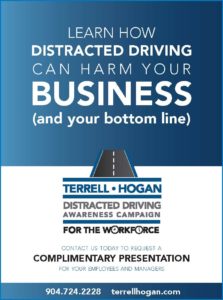April is Distracted Driving Awareness Month and the latest numbers from the National Highway Transportation Administration are in: in 2013, 3,154 people died and 424,000 were injured in car crashes nationwide involving distracted driving. This represents a 6.7% decrease in the fatalities from 2012. That’s good news, and a lot of people and organizations have been working to alert the driving public and lawmakers about the hazards of distracted driving.
Cognitive Distraction
The bad news continues though. While most are coming to know the dangers of texting and driving, many believe talking on the phone, especially hands-free is safe. It’s not; they are dangerously mistaken.
When you’re talking on the phone your brain is distracted. It’s focused on the call and not on the task of driving, your brain is literally miles away. Talking on the phone while driving increases your crash risk four fold, the same as driving drunk. Science shows it doesn’t matter if you’re using a hand-held or a hands-free phone.
 Debunking the hands-free myth
Debunking the hands-free myth
At first, in our For the Workforce presentation to businesses, non-profits and civic groups, the participants tend to think that hands-free talking is safe. But when I ask if they’ve ever missed an exit or driven past their destination while talking on the phone, even hands-free, almost everyone says they’ve missed their turn, or have wondered if they did.
Hands-free technology in cars
With the prevalence of hands-free technology in our vehicles, it’s easy to think it’s safer. With new vehicles having a large and increasing number of computers on board, the most important “computer” in your vehicle is your brain. You could lose your life or take someone else’s if your brain is miles away. Hands-free is not all it’s cracked up to be.
The onus is on the driver to make the conscience choice and turn off their phone, put it away or get an app that will limit your phone’s use when you’re behind the wheel. There’s too much at stake to drive distracted.
Consequences
Causing a distracted driving accident carries huge consequences: ruining a company or organization’s brand, reducing productivity, insurance rate increases, potential for civil liability, punitive damages – even criminal charges and, most importantly, having to live with the guilt of knowing selfish behavior harmed someone or took a life. Prosecutors across the country are now bringing manslaughter charges when texting while driving causes death, and next will come prosecutions for recklessly using the phone.
While the temptation to be constantly connected to our phones increases, we can combat distracted driving with education and awareness. To that end, Terrell Hogan offers two free educational presentations, one for high school students (End Distracted Driving) and one for adults, (For the Workforce).
$725,000 Settlement
Auto Accident
$810,000 Recovery
Auto Accident
$831,000 Verdict
Slip and Fall
$3.5 Million Settlement
Defective Product
$750,000 Verdict
Nursing Home Abuse
$1,900,000 Settlement
Bicycle Accident
$2.8 Million Verdict
Asbestos / Mesothelioma
$750,000 Verdict
Defective Product
Six Figure Settlement
Wrongful Death
$2.5 Million Settlement
Medical Malpractice
$10,000,000 Recovery
Asbestos / Mesothelioma
$1,300,000 Verdict
Medical Malpractice
$260,000 Verdict
Motorcycle Accident
$2.9 Million Verdict
Medical Malpractice

